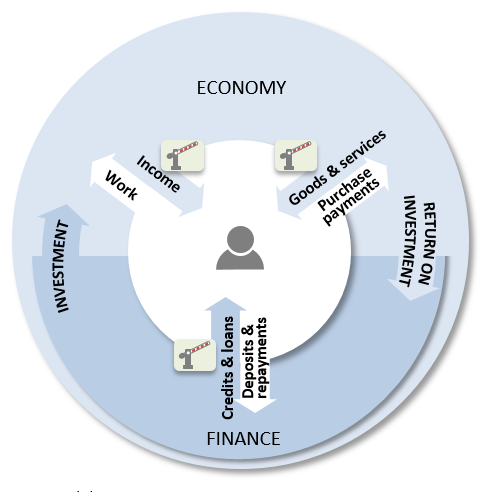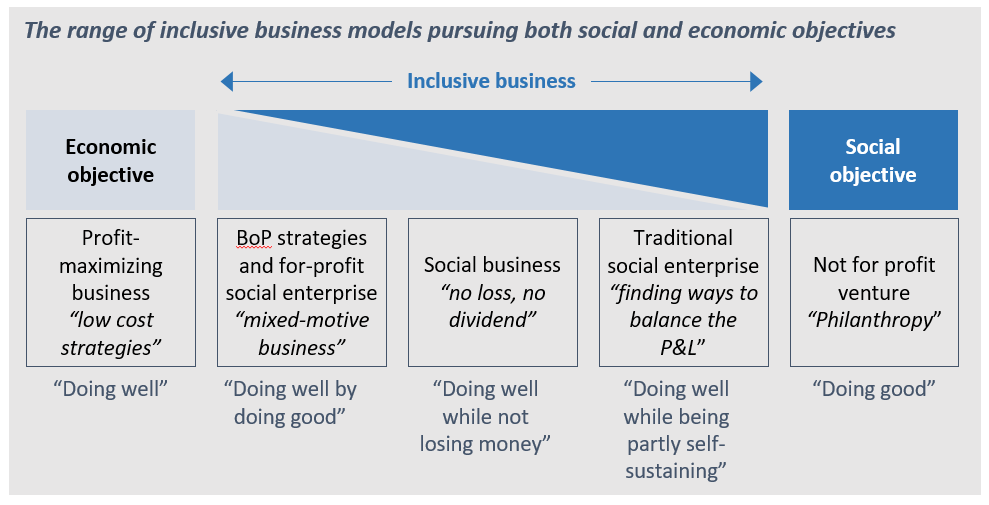What is Inclusive Business?
Executive Factsheet
Inclusive business is a form of business that aims at facilitating and fostering economically vulnerable people’s participation in economic life – by easing access to a stable and sufficient source of income, to essential goods and services, or to valuable credits and loans.
To achieve this aim, inclusive business balances social considerations with profitability objectives.
Download the PDF: What is Inclusive Business?
What is economic exclusion?
Both in developing and developed countries, a large part of the population finds itself excluded from the economic life. Economically disadvantaged persons typically:
- Struggle to find a stable and sufficient source of income through salaried jobs or as self-employed entrepreneurs);
- Have difficulties in purchasing essential goods and services, such as adequate insurance, training opportunities, quality health care, decent housing, or reliable means of transportation;
- Lack access to credits and loans (e.g. small business, housing and education loans) preventing them from improving their financial condition.
What causes economic exclusion?
Economic exclusion is the result of the barriers that prevent people from taking part in economic activities. These hurdles are of three sorts:(1)
- Structural barriers include, for instance, the lack of suitable jobs to lower-qualified workers or too expensive living costs to low income persons
- Informational barriers such as job seekers lacking the access to information on suitable employment opportunities, or low-income customers ignoring the existence of affordable, less expensive products.
- Socio-psychological barriers include, for example, discrimination in hiring (based on devalued personal characteristics such as age, race, gender, or sexual orientation) or discouraged and resigned attitudes in the job search, often due to only a few employment opportunities or repeated application rejections.
What is inclusive business?
As indispensable they may be, the state-led and NGO-supported redistribution programs and social aid schemes, address only partly the problem of economic exclusion.
The basic idea behind inclusive business is that business itself can be a lever to fight economic exclusion and to facilitate low-income communities’ participation in the economy.
Inclusive business is a form of business that precisely aims to do so by:
- Placing economically vulnerable people at the center stage of their considerations.
- Developing a business model which goal is to lift the barriers to inclusion thus facilitating low-income communities’ access to decent work, essential products, and/or valuable loans and credits.

Source: (1)
In order to achieve its ambition, inclusive business needs to balance social considerations with profitability objectives. As illustrated in the graph below, there is a broad spectrum of different forms of inclusive businesses that weight these two objectives differently.
As an example of a recent inclusive business initiative, in 2015, Renault and the Fédération Nationale des Caisses d’Epargne (a French semi-cooperative banking group) decided to jointly tackle the problem of unreliable mobility of low-income populations who depend on private means of transport for their professional activities (e.g., to find a job or to commute to work). Together, they launched “programme Mobilize”, a lease-purchase contract enabling low-income workers to buy a new vehicle at a preferential price, through microcredit.*
The “Business for Inclusive Growth” (B4IG) coalition, which was launched in 2019 at the G7 Leaders’ Summit in France, represents a major milestone in the further expansion of inclusive business practices across the corporate world. The coalition, whose activities are overseen and coordinated by the OECD, unites over 35 global companies, accounts in total for over 3 million employees and USD 1 trillion in annual turnover. Its member firms have signed a pledge to take actions for “mainstream[ing] inclusive business” in upcoming years.**
* Cf. https://mobilize.groupe.renault.com/
** Cf. https://www.oecd.org/inclusive-growth/businessforinclusivegrowth/Busine…;

REFERENCES
A. Feix, R.Durand, B. Faivre-Tavignot: Inclusive Business: What it is, what it does, and why it matters. Forthcoming Report. (2020).
More about the Movement for Social*Business Impact
Discover the Inclusive and Social Business Certificate
Discover the Master on Sustainability and Social Innovation